
Radio-Activity is the fifth studio album by German electronic music band Kraftwerk, released in November 1975. The band's first entirely electronic album is also a concept album organized around the themes of radioactive decay and radio communication. All releases of the album were bilingual, with lyrics in both English and German. The album was accompanied by single release of the title track, which was successful in France and Belgium.

War Child is the seventh studio album by Jethro Tull, released in October 1974. It was released almost a year and a half after the release of A Passion Play. The turmoil over criticism of the previous album surrounded the production of War Child, which obliged the band to do press conferences and explain their plans for the future.

Direct is a studio album by the Greek electronic composer Vangelis, released in 1988. The album marks a new development in Vangelis' music, during which Vangelis moved his creative base from London to Athens in Greece, and it was his first album recorded in Athens after relocation from London.
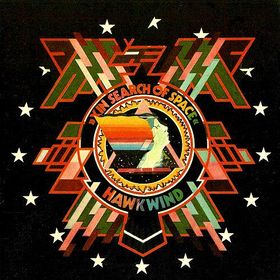
In Search of Space is the second studio album from Hawkwind, released in 1971. It reached No. 18 on the UK Albums Chart.
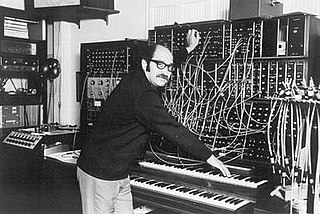
Morton Sanford Garson was a Canadian composer, arranger, songwriter, and pioneer of electronic music. He is best known for his albums in the 1960s and 1970s, such as Mother Earth's Plantasia (1976). He also co-wrote several hit songs, including "Our Day Will Come", a hit for Ruby & the Romantics. According to Allmusic, Mort Garson boasts one of the most unique and outright bizarre resumés in popular music, spanning from easy listening to occult-influenced space-age electronic pop.
Paul Henry Beaver Jr. was an American musician who was a pioneer in popular electronic music, using the Moog synthesizer. From 1967, Beaver collaborated with Bernie Krause as the recording duo Beaver & Krause.

Spring Session M is the debut studio album by American rock band Missing Persons. It was released on October 8, 1982, by Capitol Records. The title of the album is an anagram of the band's name. Produced by Ken Scott with the songs written by Terry Bozzio, Dale Bozzio, and Warren Cuccurullo, Spring Session M is a new wave rock album with elements of synth-pop.

Electronic Sound is the second studio album by the English rock musician George Harrison. Released in May 1969, it was the last of two LPs issued on the Beatles' short-lived Zapple record label, a subsidiary of Apple Records that specialised in the avant-garde. The album is an experimental work comprising two lengthy pieces performed on a Moog 3-series synthesizer. It was one of the first electronic music albums by a rock musician, made at a time when the Moog was usually played by dedicated exponents of the technology. Harrison subsequently introduced the Moog to the Beatles' sound, and the band featured synthesizer for the first time on their 1969 album Abbey Road.
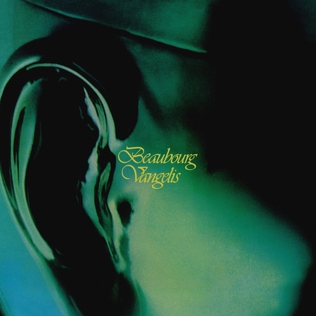
Beaubourg is a studio album by the Greek electronic composer Vangelis, released in July 1978. It was the fourth album produced by Vangelis in Nemo Studios, London, and his final album for RCA Records. It is an avant-garde-experimental album.

The Moog synthesizer is a modular synthesizer invented by the American engineer Robert Moog in 1964. Moog's company, R. A. Moog Co., produced numerous models from 1965 to 1981, and again from 2014. It was the first commercial synthesizer and established the analog synthesizer concept.
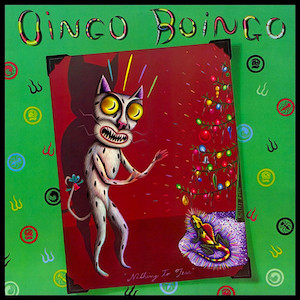
Nothing to Fear is the second studio album by American new wave band Oingo Boingo, released in 1982 by A&M Records.

So-Lo is the debut studio album by American musician Danny Elfman, released in 1984 by MCA Records. Recorded primarily by Elfman, but also featuring the members of his band, Oingo Boingo, it was recorded when Elfman was offered a solo contract with MCA after the band had been dropped from I.R.S. Records. The album marked the band's last release to feature bassist Kerry Hatch and keyboardist Richard Gibbs.
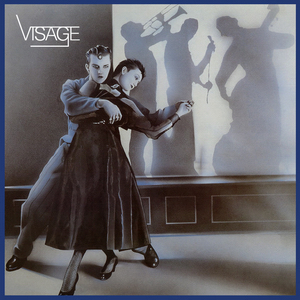
Visage is the debut studio album by the British synth-pop band Visage. It was recorded at Genetic Sound Studios in Reading, Berkshire and released in November 1980 by Polydor Records.

Pleasure Victim is the second studio album by American new wave band Berlin. It was originally recorded in 1982 and released in October of that year by M.A.O. Records and Enigma Records. After the second single, "Sex ", received considerable attention, the album was re-released on January 26, 1983, by Geffen Records in the United States and by Mercury Records internationally. The album marked the return of lead singer Terri Nunn to the group. To date, it is Berlin's best-selling album and was certified platinum by the Recording Industry Association of America (RIAA) on February 9, 1993, becoming the band's only album to do so.

The Wozard of Iz is a 1968 album of electronic music composed and realized by Mort Garson and conceived and written by Jacques Wilson. It psychedelically parodies the 1939 film The Wizard of Oz, setting the characters in the 1960s with a hippie mindset. Throughout the story the main character, Dorothy, seeks out "where it's at".

The Zodiac: Cosmic Sounds is a 1967 collaborative concept album on the theme of the signs of the Zodiac. It was issued by Elektra Records in and featured early use of the Moog synthesizer by Paul Beaver, with music written by Mort Garson, words by Jacques Wilson, and narration by Cyrus Faryar. Instrumentation was provided by members of the Wrecking Crew studio collective. It has been variously described as "a wonderful period piece" and "apt to inspire more giggle fits than stoned, pull-the-shades-down reveries".

Sacred Bones Records is an American independent record label founded in 2007 and based in Brooklyn, New York. The label has released recordings from artists including Zola Jesus, David Lynch, John Carpenter, Spellling, Blanck Mass, Crystal Stilts, Marissa Nadler, The Men, Caleb Landry Jones, Molchat Doma, DJ Muggs and The Soft Moon.

Love Life is the third studio album by American new wave band Berlin. It was released on March 12, 1984, by Geffen Records. Recorded between October and December 1983, the album features production from Mike Howlett, Giorgio Moroder, and Richie Zito. Four singles were released from the album, including "No More Words", which became the band's first top-40 single on the US Billboard Hot 100, peaking at number 23. Later, second single "Now It's My Turn" peaked at #74. The album itself became the band's highest-charting album on the Billboard 200, peaking at number 23.

Blanck Mass is a British electronic solo project by Ivor Novello Award-winning composer Benjamin John Power. He is a founding member of Fuck Buttons.

Mother Earth's Plantasia is an electronic album by Mort Garson released in 1976.



















